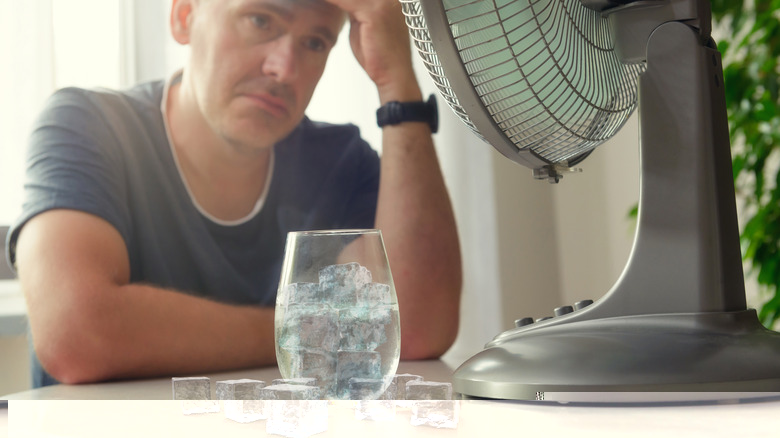TikTok's AC Hack May Seem Like A Cool Way To Beat The Heat, But Experts Warn It's A Dangerous Game
As summertime heat waves rage on, many people are struggling to keep their homes cool, especially amid rising utility costs and global temperatures. If you're tired of sweating this season, you've probably flocked to the internet in search of helpful hacks to stay cool. Google search terms like "hacks to stay cool in hot weather" have increased 5,000% in the last thirty days, and searches like "DIY AC with fan and water bottle" and "turning fan into AC" have already amassed tens of millions of views on TikTok. But before you construct your own air conditioner from a fan, heed some warnings from the experts. In an exclusive interview with House Blog, Rodolfo Jimenez, licensed electrician and owner of Safe Plug Electric, explained that when it comes to TikTok DIYs and AC hacks, all that shivers is not gold. "The hacks that trend in general on social media are not always a good idea, but you can always be sure that combining electricity and water is a terrible idea every time," warns Jimenez.
A convenient and affordable hack to make your fan blow cooler air on boiling summer days might sound tempting in the sweltering heat. However, if you try these TikTok hacks, you could be putting your home or yourself at risk for something much, much hotter: electrical burns or house fires. Here's why Jimenez says you should skip some of the most popular TikTok air conditioner DIYs and his helpful ideas to stay cool and safe this summer.
Water and electricity are a recipe for disaster
If you haven't seen social medias' DIY air conditioners for cooling your home this summer, you may feel confused about how they could be dangerous. The majority of these hacks involve placing a frozen wet towel, frozen water bottles, or even a bowl of loose ice cubes next to or on top of a standard box fan. Alarmingly, the Google search for "does putting a wet towel over a fan make it cooler?" is up 5,000% in just the last week, but in his exclusive interview with House Blog, expert Rodolfo Jimenez explains, "Putting frozen or damp towels on or near electric fans might seem like a clever way to cool down and beat the costs of using your AC, but the risk is incredibly high."
Jimenez explains, "When moisture interferes with the electrical systems in the fan, it can overheat. If the airflow is blocked by towels or bottles, the motor can get too hot and potentially start a fire. This can quickly escalate, causing serious damage to your home." If the idea of a house fire isn't scary enough, there are other dangers if you, a child, or a pet touches the wet fan. "Fans aren't designed to handle moisture, so there's a real danger of water getting into the electrical parts, causing a short circuit," warns Jimenez, "This can lead to you or your loved ones getting shocked, especially if the fan is older or has any exposed wiring."
Seek shade and air circulation instead
Mindlessly following internet hacks like these is rarely a good idea, and it may not even be necessary to bring the temperatures down in your home. In his exclusive interview with House Blog, Rodolfo Jimenez offered some alternatives. He says, "Rather than focusing on trying to find a hack that can bring danger, try finding alternatives to cooling your home, like blackout curtains or window films," Additionally, Jimenez suggests checking your ceiling fans; "You can also make sure that your ceiling fans are spinning counter-clockwise to create a breeze that keeps you cool." Wearing loose, lightweight clothing and staying hydrated can also help your body maintain a stable temperature.
Small changes like these can make a surprisingly big difference indoors, but long-term investments may be necessary to stay comfortable. "In general, the hacks that you see on social media don't actually work to get to the root of the issue," says Jimenez, "The heatwave is taking over the country, and in some places, this is only the first of many." Order a tune-up for your AC unit, ensure that your home has sufficient insulation, or consider purchasing a window AC unit for rooms that need an extra boost. Even if you're deterred by the idea of how much an AC repair will cost you, it's still much cheaper than recovering from a house fire and worth it, in the long run, to keep yourself and your loved ones safe.


